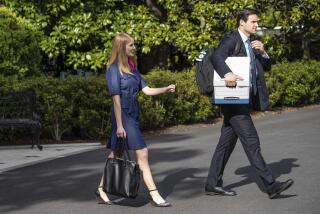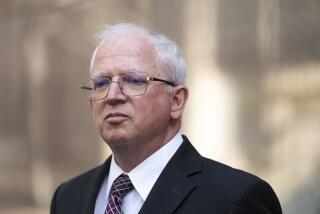Deaver Not a Liar, Lawyer Says in Final Summations
- Share via
WASHINGTON — Former presidential aide Michael K. Deaver is “not a perjurer or a liar” and never sought to conceal any facts about his lobbying activities from federal investigators, Deaver’s chief defense counsel told jurors Thursday at the close of his perjury trial in federal court.
Defense attorney Herbert J. Miller Jr. said that most of the lobbying contacts Deaver is charged with lying about “were one- or two-minute conversations,” adding: “How could anyone recall all of those?”
Whitney North Seymour Jr., the court-appointed prosecutor, also summed up his case, asking jurors to return a verdict of guilty on all five perjury counts to “uphold the motto of ‘equal justice under law’ that is emblazoned above the entrance to the Supreme Court.”
Friends in High Offices
“You will never see a better case than this one to make sure the laws are applied equally,” Seymour declared. “The defendant here is highly placed. He’s an important person. His friends are in high offices.”
U.S. District Judge Thomas Penfield Jackson told jurors that they will begin deliberating the case today after he gives them lengthy instructions on the law governing perjury.
Although Miller had told the jury in his opening statement in October that Deaver’s defense would be based partly on grounds that he was a recovering alcoholic and that his memory of some key events had been cloudy, he was unable to use that argument in his summation.
Because Miller chose to rest his case Monday without calling any witnesses, including some physicians who were prepared to testify about Deaver’s health problem, the judge said that Miller had presented no evidence of alcoholism to argue to the jury about.
Tells of Good Character
Instead, Miller relied on belittling the prosecution’s evidence and telling the jury of Deaver’s good character.
“This is not a case of political corruption or about whether a man lost practically all the business he had because of the long investigation,” Miller said.
“If Mr. Deaver had violated any ethics laws, they would have indicted him 15 times over and been pleased to do it. But he’s an honorable, upstanding man. He didn’t have to lie because he hadn’t done anything illegal.”
Miller noted that Seymour and a congressional committee that questioned Deaver under oath last year had both subpoenaed thousands of his documents and other government records.
“It would have been stupid under those circumstances for him to deliberately lie about his activities,” the defense counsel said, pointing out that many of his lobbying contacts had been well-documented.
Inaccurate Testimony
Although Deaver may have testified inaccurately about certain events, Miller said, he did not intentionally lie, which is the key element a jury must determine in a perjury case.
Seymour, on the other hand, declared that Deaver “deliberately gave false answers under oath in order to block inquiries into his lobbying activities” aimed at determining if he had violated government ethics or conflict-of-interest statutes.
Ethics statutes generally prohibit former high government officials from returning to lobby their old colleagues during the first year they are out of office, but Seymour eventually learned that a technical interpretation of those laws divides the White House into several components, allowing Deaver, as former deputy chief of staff, to lobby persons in the National Security Council or the budget office, for example, as if they were totally separate agencies.
Seymour cited Deaver’s statement, in one count of the perjury indictment, that he had never sought as a lobbyist to obtain an audience with President Reagan for a representative of South Korean President Chun Doo Hwan. This congressional testimony of Deaver was contradicted by trial witnesses.
More to Read
Get the L.A. Times Politics newsletter
Deeply reported insights into legislation, politics and policy from Sacramento, Washington and beyond. In your inbox twice per week.
You may occasionally receive promotional content from the Los Angeles Times.










